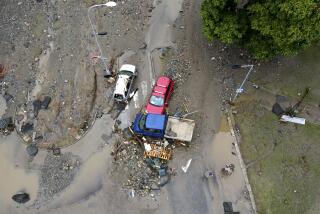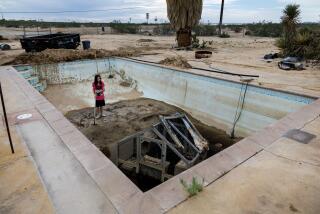Flood Victims in Poland Struggle for Aid
SIECHNICE, Poland — Right after July’s floods, there was solidarity. With water up to their roofs, the people of Siechnice blocked a road with tires and protested until politicians visited and had the water pumped out.
Now, the townsfolk are quarreling, exasperated with state aid that they say is inadequate and unfairly distributed. Organized, assertive people are recovering, while those less adept at handling bureaucracy are struggling. Neighbors are at odds over the difference.
“When the water receded, people started to argue,” says Stanislawa Wisniewska, a 44-year-old grammar-school teacher. “Who took more washing powder? Who took more cans of meat? All kinds of fights broke out over who was getting the most aid.”
Part of the problem is that flood relief has been somewhat disorganized. Red Cross workers here in Poland’s flood-struck southwest, for example, still cannot pin down how many people are homeless.
But a bigger problem may be the attitude of people in a recently communist country accustomed to waiting for the state to take care of them. Charities and the government have given aid, but Poles must also fend for themselves.
“I’m not pushy enough,” Wisniewska admits. “You need to quarrel, to fight, to stand in line to get any aid at all.”
Still, she’s managing. Like most people in Siechnice, she and her two children are living in their attic while they repair the water-damaged main floor. Her yard, like others, is covered with sand, plaster and bricks. The whole town is a giant construction site.
The floods in southwestern Poland caused $2.8 billion in damages, according to a recent government estimate. Fifty-five people were killed, about 162,000 were evacuated, and 46,000 homes and apartments were swamped.
Everyone in Siechnice got 3,000 zlotys--about $860--from the state, and most people received an additional 1,000-1,500 zlotys from a private Polish relief fund.
Wisniewska got cement from the Roman Catholic church and a charity. For the rest of rebuilding, she borrowed the equivalent of $2,300 from relatives.
She and others are hurrying to finish construction before winter comes.
Poland’s central flood headquarters says utilities in the area should be completely restored this month. Most roads and railways have been repaired and electricity is back on. But 31,000 phone lines are still down, and few of the hard-hit towns and villages have heat.
The flooding was concentrated around the cities of Wroclaw and Opole. Wroclaw, 9 miles from Siechnice, is a Polish treasure, with canals, medieval churches and a city square freshly restored for Pope John Paul II’s visit to his native country last spring.
When the floods came, state workers and volunteers piled sandbag after sandbag around Wroclaw to hold back the rushing Oder River. They saved historic sites but other buildings sustained ground-floor damage.
Utility worker Bogustow Sobieraj, who is about 6 feet tall, says there was water in his Wroclaw basement up to his shoulders. When the flood waters receded, they left behind sand up to his waist.
“It was nothing compared to these people,” he says, gesturing to the wrecked houses of Siechnice, where he has been laying steam pipes since mid-September. Even he has noticed the animosity between neighbors and the differences between how people are coping.
“It’s the law of the jungle,” he says. “The strong survive.”
That Poles are still trying to get organized after decades of communism was clear almost as soon as rivers first began overflowing in early July. The government, led by former communists, was criticized for being slow to fight the flood and to evacuate people. In national elections Sept. 21, they lost.
One government benefit to flood victims was to offer cheap loans, at 2% interest with a year’s grace period. But getting a loan requires paperwork, and some townspeople couldn’t manage.
“I just gave up,” 54-year-old retiree Jan Glapa says of his efforts to get a 25,000-zloty ($7,140) loan. He says the bank wanted an assessment of the damage and a timetable for repairs.
“Why do you need a timetable?” he asks. “It’s crazy. You’ve got your friends to help you. They come today. They don’t come tomorrow. You can’t make a timetable. And yet the bank demands this.”
His hands and clothes grimy with mud, Glapa is rebuilding the main floor of his house with money from his pension, the government and some charities. His son-in-law is helping, while his daughter and 3-month-old grandchild stay with relatives.
Up in the attic where they live, Glapa’s wife shows a Red Cross shipment that just arrived: a box of towels, sheets, cleaning fluid and a scrubbing brush.
Aid shipments are distributed from the house of a volunteer--Stefania Nowakowska, apparently the most resourceful person in town.
She and her husband did get a low-interest loan, which enabled them to rebuild quickly. Her floors are newly tiled, the walls newly plastered. Her newly wired telephone rings as she sits at a table on her front porch with a list of people eligible for Red Cross packages.
The contrast between her situation and her neighbors’ is striking.
“I just stamped my foot in the right places,” she says. “I moved heaven and earth to get that money. You can’t just wait for things to happen.”
Some townspeople have been envious, she says.
More to Read
Sign up for Essential California
The most important California stories and recommendations in your inbox every morning.
You may occasionally receive promotional content from the Los Angeles Times.










